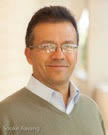 Dr. Juan Lucena, Director of the Colorado School of Mines’ Humanitarian Engineering Program, classifies himself as someone “who has never been satisfied with the answer that engineering is just to help corporations make profit or to help countries be secure.”
Dr. Juan Lucena, Director of the Colorado School of Mines’ Humanitarian Engineering Program, classifies himself as someone “who has never been satisfied with the answer that engineering is just to help corporations make profit or to help countries be secure.”
“Engineering has to be more than that,” he asserts. “It also has to be for serving society, helping people live better and more fulfilling lives, and protecting our natural environment.” Originally, Dr. Lucena is from Colombia, South America. He moved to Harlem, NY when he was 13 years old and became a US citizen at age 40.
In Dr. Lucena’s own words, “now I am from nowhere and everywhere, or as one of my favorite songs says, ‘Ni soy de aqui, no soy de alla.’” A Mechanical and Aeronautical engineer from Rensselaer Polytechnic Institute, Dr. Lucena has now been at Mines long enough to climb Lookout Mountain on his bike in under 22 minutes (the record stands around 16 minutes).
“I believe that corporate, national, societal and environmental goals can all be achieved through engineering, but to get there we need to seriously rethink the way we educate our future engineers. We cannot achieve these goals educating engineers in the conventional ways that were established in the Cold War,” expresses Dr. Lucena.
One way that the education of engineers is being re-shaped is through CSM’s Humanitarian Engineering (HE) program, which started in 2003 as the first program of its kind in the United States. Now with stiff competition from universities like Penn State, Michigan Tech, and Purdue, CSM still enjoys unique HE courses like “Engineering and Social Justice” and “Human-Centered Problem Definition.”
Dr. Lucena explains that Mines’ HE program, “after 12 years in existence… has matured to become an inspiration for many students who want to pursue careers helping corporations be more socially responsible in their interactions with communities and the environment, or designing assistive technologies for persons with disabilities, or building appropriate technologies to improve communities’ wellbeing.”
“I teach students to think critically about engineering, its methods, designs, processes, practices, etc. so they can become more socially responsible professionals,” he explains. From “Engineering and Sustainable Community Development,” to “Engineering and Social Justice,” Dr. Lucena strives to involve students directly into the learning process in all HE courses.
One of the greatest challenges of working in HE, according to Dr. Lucena, is “to educate students to understand that their desire to help communities sometimes can do more harm than good.”
Despite the challenges, there are also numerous rewards to working in the field. “My biggest reward is when graduates tell me that, thanks to what they learned in the HE program, they are changing the way their employers impact communities and the environment. In short, when they tell me that they have become agents for positive change in the world,” Dr. Lucena explains.
After working with Mines students for many years through the HE program, Dr. Lucena’s advice is to remember that “no matter how good a paycheck is, never settle for a job that does not inspire you to serve society or the environment or a group of people that you care about. Nev

'Dr. Juan Lucena Challenges Preconceived Notion of Engineering' has no comments
Be the first to comment this post!